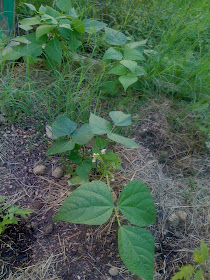WARNING: This post is about butchering our rooster. There are no pictures, but I tried to be honest and descriptive. If you don't want to read about it in vivid detail, please don't. I have no intention of offending anyone, but I do want to share my experience because it was a difficult thing to do and it was important to me to share.
So please, if you don't want to know what happened, don't read this entry. But please realize that if you eat meat, an animal had to die for you to eat dinner.
Several months ago, we figured out that one of our supposed-to-be-pullets was actually a rooster. We've accidentally ended up with two other roosters, both of which we gave to the barn where we boarded our horses. Unfortunately, roosters are the unwanted by-product of the backyard egg production trend, and there are loads of them available on Craigslist for free. Another blogger wrote a great article on why the responsible thing to do with unwanted roos is to butcher them, and I have to agree with her. I might be able to give our roos away, but why? For all I know they're going to end up in cock fights, and that's not the kind of life I'd want for any of my animals. Besides, I've spent time and money raising the bird - since I'm a carnivore, why shouldn't I have him for dinner if he can't serve any otherwise useful purposes at my house?
To be honest, the hubby and kiddos weren't very excited about this idea. I really wasn't either, but what else was there to do? The reality of some industries, like the egg industry or dairy industry, is that male animals have no value. Often they are killed at birth (read some dairy goat forums if you don't believe me). At least my roo had a great life as a pastured chicken before his one bad day.
So, a month or so ago, I had arranged with a local farmer that "when the time came," I could come out to his farm and he would teach me how to butcher our rooster. Well, that time came last week, when not only had Mr. Roo discovered crowing (every 30 seconds or so, all day every day, from before sunup till dusk), but he also decided to come after me once or twice. If you've never been around a rooster, they can be MEAN. They can and will attack you if you get close to their girls. And they won't quit when you try to fend them off - why do you think people use birds for cock fighting? So between the crowing and the demonstration of his willingness to attack humans, his time had come.
The night before, when everyone came in to roost, I snagged him and put him in one of our carriers with some water. In the morning, I loaded him up in the car and drove the 30 minutes to the farm (Mr. Roo crowed the whole way there.) When I arrived, the farmer was very helpful, showed me all the equipment, and then we began with about 20 older laying hens who were about to begin "enjoying their retirement."
Now let me be perfectly clear here. There are a lot of euphemisms for butchering a chicken or any other animal. I've heard it called "processing" or "harvesting" or, as the farmer so neatly put it, "enjoying their retirement." Using terms like this protect us from what is really happening - you are killing an animal in order to eat it. In this sort of small-scale arrangement, you do so by holding the chicken's head in one hand, then taking a sharp knife and slitting its throat. You are killing another living animal, and watching its life blood pump out onto the abattoir floor. It is not an easy thing to do, either physically or mentally, but then, I don't think killing something should ever be easy. Hunters at least try to drop their quarry at a distance, with a gun (although I realize that's not always clean either, and you have to finish the job up-close). But with chickens, you do it eye-to-eye. It's a very personal thing to do.
But I'm getting ahead of myself. We started on the older hens. They were put upside-down into killing cones. There was a bit of squawking, but for the most part, once they were in, they were calm. Then was the hard part - you hold the head in your left hand, then make two cuts using a very sharp filleting knife, one on either side of the neck. The goal is to cut the arteries but leave the windpipe intact, so that the heart will continue beating and the blood will all pump out. This was by far the worst part. Some of the chickens struggled. They did not die instantaneously. It took perhaps a minute, maybe 90 seconds for them to bleed out and die. I watched it, because I felt like I needed to. It was not easy to see.
However, once they had bled out, the rest of the process was relatively easy. First, into a 150 degree scalder for 90 seconds, then into the barrel plucker to remove all the feathers. Pull off the head (and try not to think about that too much), then cut off the legs at the joint. Slice the oil gland off the tail, then pinch the skin under the belly of the bird and slit that. If it's a hen, check to see if there's an egg trapped inside, and remove that for later eating. Stick your hand (yes, I was wearing gloves) into the body cavity, gently pry the intestines away from the cavity wall, and pull them out. As the intestine comes out, cut it out along with the vent. If you're saving the heart and liver, set those aside. Finally, wash the bird, inside and out, make sure you've got all the innards out, then put it on ice. That's it. Maybe 5-7 minutes per bird, from the time you take it out of the crate to the time it's on ice. To go from living to dinner-ready in 5-7 minutes. I'm still sort of uncomfortable with that.
I ended up doing the washing part for most of the hens, since the farmer was letting me process my bird for free in exchange for a little help. It really wasn't so bad, not any different than washing a chicken at home once you've brought it home from the store. But then came time for my own rooster, and I did the entire process myself.
Getting him in the killing cone was easy. Slitting his throat was awful. I tried and tried but just could not get the knife to cut. The helper showed me twice how to hold the knife but I still couldn't seem to get it. I wanted to do it quickly so it would be over for Mr. Roo as fast as possible, but I was really nervous and frankly, a little sick-feeling. I had to press quite hard in order to cut through the feathers and the skin, and all the while I was holding his head in my left hand. It was so personal - a living, breathing creature waiting for me to cut its throat.
Fortunately he didn't struggle while I was trying to get the job done, or I probably would have cut my own hand off. But, eventually, I managed to get the right side of his throat. Blood spurted - it wasn't neat at all. I did the left - that was easier although I didn't manage to cut very deeply, since he was struggling a bit at that point. Since I wasn't able to make a good cut, it took longer than it should have for him to bleed out. He struggled some as it was happening, and I felt horrible. I didn't cry, but as I told a friend later, I felt somehow dirty and unclean for having done such a thing.
Soon enough, his struggles ended, and then it was just a matter of turning him into a dinner-like object. I'm guessing that he dressed to about 2.5 lbs, but I didn't have a scale to weigh him. Certainly he was a lot smaller without his feathers, and much smaller than any bird I've ever bought from the store. I took him home and tossed him in the crock pot along with some wine and seasonings (coq au vin, anyone?). I admit that I really didn't want to deal with cooking him, but I did anyway. I ended up stripping the bones and putting the meat in the freezer to deal with later. I don't want any chicken to eat right now.
Be that as it may, I now know what goes into getting that chicken onto my table. I'm not entirely comfortable with it, and I sure am not looking forward to doing it again (I'm sure we'll end up with more roosters sooner or later, or our older hens when they stop laying). Killing animals is hard, having grown up in a part of American society where animals are pets. Obviously not everyone has the luxury to feel that way toward animals - I am sure that for most people in the world, if you want to eat, you have to kill it first-hand. So what is a paradigm shift for me - animals that I raise and kill myself as food - is normal for many, many people, and they don't have the luxury of contemplating on it as I do. Obviously, in American society we are far removed from our food sources. Beef, pork, lamb, and chicken might come in neatly-wrapped packages from the grocery store, but an animal has to die for that meat to get in that package. Foisting that killing off on someone else is a luxury, and it leaves us removed from the reality of our food sources. It seems like there's something fundamentally wrong with that paradigm.
This post has actually been sitting in my draft box for over two weeks now. I still haven't eaten chicken of any sort since I butchered Mr. Roo. I still feel like there's blood on my hands, and I still think about what I did in very vivid imagery. While I'm not going to be turning into a vegetarian any time soon, I now think more about the animal that died so that I could have my dinner, and every time I sit down to the table I take my meal a little less for granted. I hope that having read this, you will too.
 Oooh! Yes! That ear! Scratch that ear!!!
Oooh! Yes! That ear! Scratch that ear!!! I believe one of the tenants of Being Cute (according to the experts at Cute Overload) is dangling your paw. Here the kitten practices.
I believe one of the tenants of Being Cute (according to the experts at Cute Overload) is dangling your paw. Here the kitten practices. And for the money, the cute cuddle shot.
And for the money, the cute cuddle shot.










































